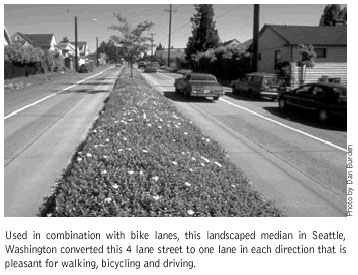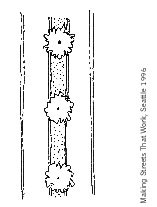Road Design
16. Raised Medians
Medians -- raised barriers in the center portion of the street or roadway are appropriate in some locations and not appropriate in others. They are a pedestrian benefit, because they can serve as a place of refuge for pedestrians who cross a street midblock or at intersections. They provide space for street trees and other landscaping which, in turn, can help reduce speeds by changing the character of a street. They also have benefits for motorist safety when they replace center turn lanes. Desired turning movements need to be carefully provided so that motorists are not forced to travel on inappropriate routes such as residential streets or an unsafe U-turn condition is not created.
Continuous medians may not be the most appropriate treatment in every situation. In some cases, they can increase traffic speeds by decreasing the perceived friction through separating traffic flow directions. They may also take up space that can be better used for wider sidewalks, bicycle lanes, landscaping buffer strips, or on-street parking. In some environments, medians can be constructed in sections creating an intermittent rather than continuous median. Another good alternative device for two, three or four lane roads is the crossing island, which provides the crossing refuge for pedestrians, and in some designs, aids in decreasing vehicle speeds.
Raised medians are most useful on high
volume, high speed roads.


Purpose:
- Manage motor vehicle traffic and provide comfortable left-hand turning pockets with fewer or narrower lanes.
- Provide a refuge for pedestrians crossing the street.
- Provide space for street trees and other landscaping.
Considerations:
- Consider crossing islands if cost is an issue or space is limited.
- Ensure there is enough room for wider sidewalks, bike lanes and planting strips before proceeding with construction.
- Landscaping in medians should not obstruct the visibility between pedestrians and approaching motorists.
- Midblock crossings must be fully wheelchair accessible.
Estimated Cost:
The cost for adding a raised median is approximately $15,000 to $30,000 per 100 feet, depending on the design, site conditions, and whether the median can be added as part of a utility improvement or other street construction project.